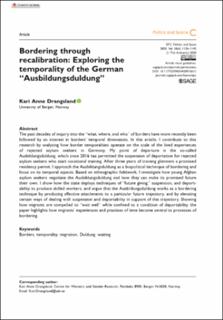| dc.contributor.author | Drangsland, Kari Anne Klovholt | |
| dc.date.accessioned | 2021-02-16T13:35:32Z | |
| dc.date.available | 2021-02-16T13:35:32Z | |
| dc.date.created | 2020-11-20T13:13:47Z | |
| dc.date.issued | 2020 | |
| dc.identifier.issn | 2399-6544 | |
| dc.identifier.uri | https://hdl.handle.net/11250/2728433 | |
| dc.description.abstract | The past decades of inquiry into the “what, where, and who” of borders have more recently been followed by an interest in borders’ temporal dimensions. In this article, I contribute to this research by analyzing how border temporalities operate on the scale of the lived experiences of rejected asylum seekers in Germany. My point of departure is the so-called Ausbildungsduldung, which since 2016 has permitted the suspension of deportation for rejected asylum seekers who start vocational training. After three years of training glimmers a promised residency permit. I approach the Ausbildungsduldung as a biopolitical technique of bordering and focus on its temporal aspects. Based on ethnographic fieldwork, I investigate how young Afghan asylum seekers negotiate the Ausbildungsduldung and how they can make its promised future their own. I show how the state deploys techniques of “future giving,” suspension, and deportability to produce skilled workers, and argue that the Ausbildungsduldung works as a bordering technique by producing affective attachments to a particular future trajectory, and by elevating certain ways of dealing with suspension and deportability in support of this trajectory. Showing how migrants are compelled to “wait well” while confined to a condition of deportability, the paper highlights how migrants’ experiences and practices of time become central to processes of bordering.
Keywords Borders, temporality, migration, Duldung, waiting | en_US |
| dc.language.iso | eng | en_US |
| dc.publisher | SAGE Publication | en_US |
| dc.relation.uri | https://journals.sagepub.com/doi/full/10.1177/2399654420915611#articleCitationDownloadContainer | |
| dc.rights | Navngivelse 4.0 Internasjonal | * |
| dc.rights.uri | http://creativecommons.org/licenses/by/4.0/deed.no | * |
| dc.title | Bordering through recalibration: Exploring the temporality of the German "Ausbildungsduldung" | en_US |
| dc.type | Journal article | en_US |
| dc.description.version | publishedVersion | en_US |
| dc.rights.holder | © The Author(s) 2020, | en_US |
| cristin.ispublished | true | |
| cristin.fulltext | original | |
| cristin.qualitycode | 1 | |
| dc.identifier.doi | https://doi.org/10.1177/2399654420915611 | |
| dc.identifier.cristin | 1850411 | |
| dc.source.journal | Environment and Planning C: Politics and Space | en_US |
| dc.source.pagenumber | 1128-1145 | en_US |
| dc.relation.project | Norges forskningsråd: 259519 | en_US |
| dc.identifier.citation | Environment and Planning C: Politics and Space. 2020, 38 (6), 1128-1145. | en_US |
| dc.source.volume | 38 | en_US |
| dc.source.issue | 6 | en_US |

